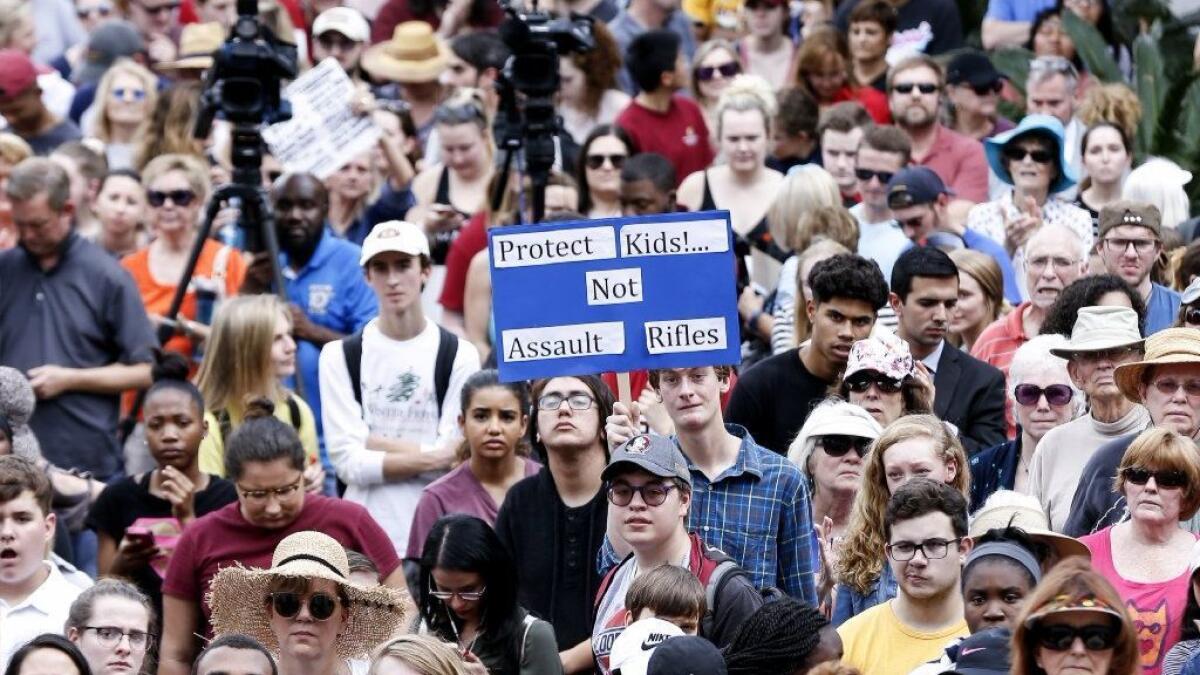Members of the first generation to grow up with social media at its fingertips launch a gun-control movement

When Twitter launched in 2006, the youngest students of Marjory Stoneman Douglas High School were toddlers, the oldest just out of kindergarten. They would be part of the first generation to grow up with social media at their fingertips, and with an innate understanding of how to amplify their voices to reach state, national and even international audiences.
After a gunman killed 14 of their peers and three school staff members on the grounds of their Parkland, Fla., school last week, the reaction to share facts, questions and outrage on social media was immediate.
On Twitter and in interviews, the students have pleaded for adults to combat the violence that visited their campus and so many others. Their rally cries quickly gained mainstream attention, and echoed in the halls of schools throughout the nation.
In the week that followed the Valentine’s Day shooting, the teens garnered hundreds of thousands of followers in the process. Twitter even verified their most active accounts, stamping a blue checkmark on their profiles to cement their legitimacy.
The students have made it clear that they won’t stay quiet. And they aren’t waiting to be called on, either.
These are the Florida students behind the movement to end gun violence »
Shortly after President Trump tweeted his “prayers and condolences” to the victims and families, it was a sophomore’s raw tweet that turned viral.
“I don’t want your condolences you ..., my friends and teachers were shot. Multiple of my fellow classmates are dead. Do something instead of sending prayers. Prayers won’t fix this. But Gun control will prevent it from happening again,” Sarah Chadwick wrote. Before the tweet became unavailable, it had more than 144,000 retweets.
Now, pinned to the top of her Twitter account is an apology for her profanity, and a resolve not to back down. She’s not the only one.
That evening, Chadwick’s peer Cameron Kasky sat at his computer and took to Facebook once again. The 17-year-old had been sharing his emotions throughout the day. As with other mass shootings that preceded this one, he knew that a standard offering of “thoughts and prayers” would come from lawmakers. But they weren’t enough.
“Please don’t pray for me. Your prayers do nothing,” he wrote. And addressing voters, he added, “Show me you care in the polls.”
His posts were shared widely. An invitation to write an op-ed for CNN would follow, then an on-camera interview. The following Wednesday, the same day that Trump hosted a listening session with gun shooting survivors and parents at the White House, Kasky addressed one of the lawmakers he criticized – Florida Republican Sen. Marco Rubio. During the CNN town hall, Kasky pressed Rubio about whether he would reject future donations from the National Rifle Assn. in an exchange that gained considerable attention.
Less than two days after the shooting, Kasky launched the “Never Again” movement — doing so, he said, while wearing his Ghostbusters pajamas. With the help of his peers, the movement includes a website, logo, Facebook page and Twitter handle. The first tweet on the @NeverAgainMSD account shared an initial goal to get the phrase “Never Again” trending on Twitter. Since then, the group has also set March 24 as date for the March for Our Lives – a demonstration against gun violence in Washington, D.C.
The movement’s organizers include several Stoneman Douglas students, such as David Hogg. The school reporter who interviewed fellow students hiding in a closet during the shooting has become a recent target of conspiracy theorists who have falsely accused him, and other students, of being crisis actors.
Chadwick is also part of the group. So is Emma Gonzalez, a senior who delivered a speech Saturday criticizing Trump and the NRA. Shared by millions across the globe, her message was resounding: “We call b.s.”
Parkland junior class president Jaclyn Corin is another “Never Again” member. The 17-year-old organized a bus trip to the Florida state Capitol in Tallahassee in an effort to push for gun law changes.
That same day, the state Legislature voted against a motion to take up a bill that would ban assault rifles. But a scroll through the #NeverAgain feed on Twitter reveals that the students of Stoneman Douglas, and their growing supporters, have no intention of quitting.
Twitter: @cshalby
ALSO:
These are the Florida students behind the movement to end gun violence
A changing of guard: After unthinkable tragedy, Generation Z emerges loud and clear
Sign up for Essential California
The most important California stories and recommendations in your inbox every morning.
You may occasionally receive promotional content from the Los Angeles Times.








